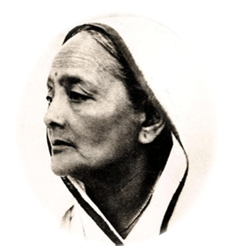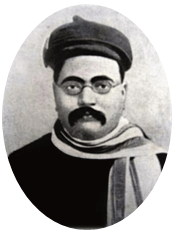Thursday, March 20, 2014
Wednesday, March 19, 2014
Tuesday, March 18, 2014
Monday, March 17, 2014
Sunday, March 16, 2014
Saturday, March 15, 2014
Friday, March 14, 2014
Thursday, March 13, 2014
Wednesday, March 12, 2014
NATIONAL CONFERENCE on Thought of Epoch Making Thinkers & It's relevance in the Present
NATIONAL CONFERENCE
on
Thought of Epoch Making Thinkers
&
It's relevance in the Present
(March 20th - 21st
March, 2014)
Organized by
SCHOOL OF THOUGHTS,
NORTH MAHARASHTRA UNIVERSITY, JALGAON
VENUE: Senate Hall, North Maharashtra University,
Jalgaon, MS, India.
Tel. No. +91-257-2257 431 | Website: www.nmu.ac.in
Tuesday, March 11, 2014
Gandhi Journal Article - III
Role of Mahatma Gandhi in Women's Political Participation
By Dr. Shubhangi Rathi
Mahatma Gandhi has played an important role in the participation
of women in political activities in India. Gandhi becomes uncompromising in the
matter of women's rights. According to him woman is companion of man and gifted
with equal rights of freedom and liberty. Woman is the better half of humanity,
not the weaker sex. Father of the Nation, Mahatma Gandhi was the first man to
encourage participation of women in politics. The Constitution of India
guarantees equal rights to men and women as voters and citizens. Presently
there are very few women Parliamentarians in India. It shows that Gandhi's
ideas about women and their role in political life was a departure from those
of the 20th century reformers. In the 21st century, it is clear that quotas for
women in politics have not essentially ensured higher equality. For the success
of democracy, active participation of women is essential. In this paper my
focus is on participation of women in politics in India and Mahatma Gandhi's
role in motivating large numbers of women into mainstream politics. As per
modern theory, both men and women are integral parts of social, economic and
political set up of a state. Keeping this background in mind, this paper seeks
to focus on the share of women in the electoral process of India.
Monday, March 10, 2014
Sunday, March 9, 2014
Saturday, March 8, 2014
Newsletter: Not a woman you could cross
Not a woman you could cross
Gopalkrishna Gandhi
Mridula
Sarabhai did more than any party for communal harmony and for human rights
years before the latter phrase gained currency
It is Women’s Day and memories of certain
amazing women swim into one’s thoughts.
To certain people a calling comes most
naturally. Mridula Sarabhai, daughter of Mahatma Gandhi’s early collaborators
Ambalal Sarabhai and sister of the nuclear scientist Vikram Sarabhai, was meant
for the rough life. Born in 1911, she died at age 63 in 1974. She looked the
rough role all right. One of the proudest women ever made by God, the most
sneeringly contemptuous of cowardice and of ‘safe playing’, Mridula had more of
a brave man in her than a woman. Ever in her Pathan salwar-kameez outfit with a
man’s collar, she looked like she could pound an adversary on his nose without
a moment’s thought. Or shower imprecations on him. And of adversaries she had
no dearth.
Friday, March 7, 2014
Thursday, March 6, 2014
Gandhi Journal Article - II
Gandhi's Influence on a
Catholic Archbishop
By Paddy Kearney
As a schoolboy Denis Hurley regarded Mahatma Gandhi as a
troublemaker who was doing great damage to the British Empire. Later on, as
Archbishop of Durban, he described Gandhi as one of the greatest souls since
Francis of Assisi in the 13th century.
Wednesday, March 5, 2014
Tuesday, March 4, 2014
Gandhi Journal Article - I
The woman behind the Mahatma
By Shail Raghuvanshi

Mahatma Gandhi, the Father of the Nation needs no introduction. That he worked hard to transform himself from Mohandas Karamchand Gandhi to the Mahatma, everyone knows. That he fought hard to help India and its citizens to get their deserved freedom is also well known. Though, how much of it is appreciated today I am not very sure. What few know or even bother to remember is the person behind the Mahatma's success. Yes, indeed. I am referring to Kasturba Gandhi, the simple, unassuming wife of the Mahatma.
Monday, March 3, 2014
Sunday, March 2, 2014
Saturday, March 1, 2014
Friday, February 28, 2014
The Best Advice I Ever Had
The
Best Advice I Ever Had
By
Vijaya Lakshmi Pandit
Thursday, February 27, 2014
Wednesday, February 26, 2014
Tuesday, February 25, 2014
Monday, February 24, 2014
e-Newsletter of Gandhi Seva Kendra, Hyderabad
e-Newsletter
of Gandhi Seva Kendra, Hyderabad
Many
regions of the world are inflicted by violence and strife. Peace loving people
all over the world, including leaders, are in search for a solution to these
problems. One name that emerges is that of Mahatma Gandhi. Mahatma Gandhi is
more relevant than ever in the world today. Many peace-loving individuals and
organizations are trying to find ways of establishing peace in the world
through the teachings of Gandhiji. From several world leaders to common man,
have drawn inspiration from Gandhiji. The significance of Gandhiji’s teachings
of truth, non-violence, peace, brotherhood, equality, conflict resolution and
harmonious living are imperative in today’s world which is of full of
hatred, violence, exploitation and inequality.
In
this context, Gandhi Seva Kendra, at Hyderabad have put a step ahead to
propagate Gandhiji’s ideology in the form of a book centre on 2nd October, 2013
with the objective to promote Gandhian philosophy.
Here
we presents e news letter of Gandhi Seva Kendra, Hyderabad with additional
features and news on the activities of the Kendra.
Sunday, February 23, 2014
Saturday, February 22, 2014
Life Sketch of Kasturba
Life Sketch of Kasturba
Kasturba was born in Porbandar in April 1869,
a few months before Gandhiji and in the same town. Her father, Gokuldas Makanji,
was a merchant and a friend of Gandhiji's father, Karamchand or 'Kaba' Gandhi. Both the parents
decided to knit their families closer together by marrying their two
children. At that time early marriage was a common custom in Saurashtra, as in many
other parts of India. So, the betrothal of the two children, Mohandas and
Kasturbai, took place in their seventh year. The actual wedding, however, was
celebrated in 1882, when the two began to live together as husband and wife at
the early age of thirteen. Referring to his marriage Gandhiji later observed in
his Autobiography as follows-"I do not think it meant to me anything more
than the prospect of good clothes to wear, drum-beating, marriage processions,
rich dinners and a strange girl
to Play with..........Little did I dream that one day I should severely criticize my father
for having married me as a child. Everything on that day seemed to me right and
proper and pleasing. There was also my own eagerness to get married ".
Friday, February 21, 2014
Thursday, February 20, 2014
Online Discussion on Gandhian Trusteeship and Non-violence
Gateway House cordially invites you to an online discussion on:
Gandhian Trusteeship and Non-violence: the Basis for a Creative Society
India Economic, Business & Political Series)
with
&
Ashni Biyani
at
A growing environmental crisis and the increasing inequality between the rich and the poor now constitute major risks to global economic and social stability. Societies around the world are struggling to address these issues. As the problems associated with these risks escalate, it is necessary to look at unconventional solutions. Mahatma Gandhi’s idea of Trusteeship is one such approach that can provide the basis for a creative new solution.
The idea of Trusteeship is based on the premise that you are never really the “owner” of wealth, but rather its temporary holder, a benevolent custodian. Gandhi was confident that eventually Trusteeship would offer an alternative to both capitalism and socialism. How did Gandhi conceptualise Trusteeship? How does the idea go beyond philanthropy and corporate social responsibility? Can Trusteeship become the foundation for a renewed, non-violent, and creative society?
Discuss these topics at a Google Hangout with Rajni Bakshi, Senior Gandhi Peace Fellow, Gateway House, in conversation with Ashni Biyani, Chief Ideator and Director, Future Ideas, on “Gandhian Trusteeship and Non-violence: the Basis for a Creative Society” on February 21, 2014 at 6:30 PM IST.
The live discussion will be interactive with the online audience. We invite you to post your questions in advance or during the hangout using #GHTrusteeship on Twitter or on the Google+ event page.
or
February 21, 2014.
Sincerely,
Rajni Bakshi
Rajni Bakshi is the Gandhi Peace Fellow at Gateway House, Mumbai. She is the author of a Gateway House research paper (October 2012) titled Civilizational Gandhi. She is also the author of several books, including Bazaars, Conversations and Freedom: for a market culture beyond greed and fear (Penguin, 2009), which won two Vodafone-Crossword Awards. Her earlier book, Bapu Kuti: Journeys in Rediscovery of Gandhi (Penguin, 1998) inspired the Hindi film Swades. Her other books include Long Haul: the Bombay Textile Workers Strike 1982-83 (1986); A Warning and an Opportunity: the Dispute over Swami Vivekananda’s Legacy (1994); Lets Make it Happen: a backgrounder on New Economics (2003); and An Economics for Well-Being (2007). Rajni has a BA from George Washington University, U.S, and an MA from the University of Rajasthan. She serves on the Boards of Child Rights and You (CRY) and Citizens for Peace. She is also a member of the Executive Committee of the Gandhi Smriti and Darshan Samiti, an autonomous body under the Indian Ministry of Culture, and a long-term associate of the Centre for Education and Documentation (Mumbai and Bangalore).
Ashni Biyani
Ashni Biyani is associated with Future Group, a business house in India that operates retail chains such as Big Bazaar, Pantaloons, Central and Home Town. She is the Director of Future Ideas, a consultancy for strategic thought for business and society. She leads a team that maps the behavioral shifts of consumers and communities. She has also led the conceptualisation and launch of a number of the group’s retail formats. Ashni’s team is currently working on an assessment study for the Ministry of Social Welfare and Empowerment. Ashni graduated as a textile designer from the Srishti School of Art, Design and Technology, Bangalore. She has attended courses on scenario planning at New York’s Parsons School of Design, and the Summer Institute of General Management at Graduate School of Business, Stanford University, U.S.
Wednesday, February 19, 2014
The lodestar of Indian liberalism
The lodestar of Indian liberalism
The values Gokhale embodied could have new relevance in today’s India Gopal Krishna Gokhale is now a forgotten man even though both M.K. Gandhi and M.A. Jinnah were inspired by him in the years before they became mass leaders. Gandhi described Gokhale as his political guru while Jinnah aspired to be the Muslim Gokhale.
Gopal Krishna Gokhale is now a forgotten man even though both M.K. Gandhi and M.A. Jinnah were inspired by him in the years before they became mass leaders. Gandhi described Gokhale as his political guru while Jinnah aspired to be the Muslim Gokhale.

Tuesday, February 18, 2014
Monday, February 17, 2014
Sunday, February 16, 2014
Saturday, February 15, 2014
Friday, February 14, 2014
Thursday, February 13, 2014
Wednesday, February 12, 2014
Tuesday, February 11, 2014
Gandhi Journal Article - III
Gandhian perspective on Tribal Resources and the Modern
State
By Birinder Pal Singh
Abstract
The modern state, whatever be its nature and type, has
come to stay. It has become an extremely powerful engine to steer the so-called
traditional society on the path of development following the framework of
western modernization. It is positively related to the development and
multiplication of resources for the 'benefit of its people' but negatively
related to the tribes
Subscribe to:
Posts (Atom)









































